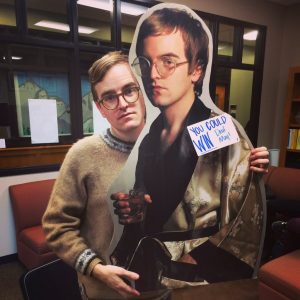
Dent May’s set at KHDX’s Hat Trick Music Festival was perfectly placed between the soulful hip-hop of Black Milk and the jazz-funk explorations of Moon Hooch. The Dent May sound veers from funk to show-tune romance to psychedelic harmonic sweetness; his music feels like a piping hot bubble bath, a goodnight kiss, or a tipsy drag off a friend’s cigarette. The opening song, “Eastover Wives,” blended a funky rhythm section with a crystalline melody. “Born Too Late,” a virulently catchy song from Warm Blanket (2013), had the entire dance floor jumping for joy. Dent May also graced us with a crop of new songs from his yet-to-be-announced new album; they demonstrated his continued growth as a classic, but unique, songwriter. Between songs, he joked with the crowd about Myspace and other relics of mid-2000s culture.
Earlier in the afternoon, Dent and his band played some of his jaw-dropping new songs for us at the KHDX booth. After the set, we sat Dent down next to a cardboard cut-out of him nestling a glass of whiskey in a kimono to talk about his genre-bending style and his old home/venue, Oxford MS’ Cat’s Purring Dude Ranch, where he has attracted countless indie and experimental acts who would have otherwise avoided our neck of the Bible Belt:
Dax Alford: You’re from the south, and a lot of your earlier music seems to have been influenced by that environment. How do you feel that moving to Los Angeles, into a new environment, has influenced the recordings you are working on now?
Dent May: So far it has just been very inspiring to be around ambitious, like-minded people and to be living a new set of experiences than what I had become accustomed to in Oxford. Part of me seems to be making a “Los Angeles” album in the back of my mind, but it’s not necessarily a conscious effort.
DA: All of your previous albums have consisted of work that was almost entirely completed by you alone. Have you become more open to collaboration as your career goes on? Do you feel that being around these inspiring and ambitious people gives you more of a drive to collaborate with other musicians?
DM: I am definitely more open than ever to the idea of collaborating with other musicians. My earlier stuff was more of a product of circumstance, as I would just record at my house without many people to play with. I’m excited to have other musicians play on my album and I have a lot of ideas surrounding that, such as looking into someone doing some string arrangements or something. I don’t currently have any concrete plans as far as that goes though. I’m also just interested in writing music with other people outside of my typical album pursuits.
Adam Nick: Your music has the tendency to combine a lot of different styles. I feel like I can put on one of your songs and hear a ‘50s doo-wop harmony paired with a drum machine sound from the ‘90s. Do you consciously try to combine stuff from different eras and styles? What are the challenges to making it work so well?
DM: It’s mostly a subconscious product of all of the music that I grew up on and still listen to. I listen to all different types of music, and growing up on the internet kind of allowed me to form a taste that draws from many different genres and eras. I feel like contemporary culture is sort of collage-like to begin with, for better or worse. I’ve never wanted to make a record that sounded like a certain point in time. For me, nothing is off limits in terms of the types of sounds and instrumentation you can combine. I just want to blend it all together.
AN: So would you think it is fair to say that you would define or contain yourself within a certain scene or a certain genre of music?
DM: Definitely not. I am very much of the philosophy that follows the popular quote “I’d never want to be part of a club that would have me as a member”. Ideas of scenes and stuff like that really turn me off. I think with other contemporary bands, it also really turns me off when someone is going for a very exact sound that may have already happened twenty or thirty years ago. While I do happen to enjoy bands that play like that from time to time, it just doesn’t excite me creatively. For me, making art is about exploring and challenging yourself. So once I’ve experienced something, I just don’t get as inspired by it as I do searching for new formulas and new sounds.
DA: When you were coming up as a musician, you were really involved with the local music scene and built up a decent reputation as somewhat of a DIY booking agent in the south with the Cats Purring Dude Ranch. What inspired you to start taking action and put on events like that in Oxford, and how do you think it has helped you as your career has progressed?
DM: Mostly it was that I was living in Mississippi and there were never any bands coming through that I liked. Ever. So I started recording my own music, getting it out there and touring a bit outside of the state at different sorts of DIY venues. Seeing that sort of thing happening was really inspiring and made me want to get involved on my own. After touring more, I started to meet all these other bands who seemed interested in the idea of playing in Mississippi, so I decided to start some stuff up. Over time and through several venues and houses, we were able to get it to a level where there are still shows being consistently booked out there today. In LA, things are really different and there aren’t as many ways that we can operate like we did in Oxford. I’m still very interested in the idea of doing things like that, and I am even looking into the possibility of setting some things up in LA, but it is a very different environment.
DA: Would you say the musician community in LA is more spread out and separated, as opposed to a community in small town like Oxford, which would seem to be fairly consolidated and connected? How does that change how they operate?
DM: For sure. It is interesting to see the different needs that each scene has. In Mississippi it was like there were never any bands coming through so it was really easy to just tell someone to come to my house one night and we have a show. That’s how we got bands like Real Estate, Grimes, and Unknown Mortal Orchestra to play there. In LA, the opposite is true. It is one of the biggest markets for touring bands, so you don’t really have the ability to draw in acts like we did in Mississippi. On the other hand, Los Angeles also lacks a lot of the community vibes that are present in smaller places like Oxford, mainly just due to the fact that it is so much bigger and there is such a larger group of people involved.
AN: Do you feel that getting involved with booking in Mississippi is what helped get your name out there? Did it have anything to do with you ending up on Paw Tracks, Animal Collective’s label?
DM: Kind of. I met [Animal Collective] before I really started doing all of that. It is hard to say what exactly happened first at the time, whether it was meeting musicians or getting my music out there, it was all happening so fast and at the same time. I was aggressively pushing my music onto blogs, and doing all other sorts of promotion. I think being involved with the scene in MS more so just helped me learn as an artist what I wanted to do with my music and how I wanted to do it. I don’t know if it helped me get my name out there.
DA: Were there situations that you encountered while being involved with the MS scene that you would say have helped you operate as a musician outside of that era of your career?
DM: It definitely helped to see a lot of live music and see what I like and what I don’t like. It helped me figured out what I wanted to do and what I wanted to embody with my own live performances. I consider myself an entertainer in the classical sense, in that I really just want to get up on stage, dance around for a bit, and make you smile. Seeing a bunch of touring acts and what they do really helped me hone my vision on what I wanted to do, and how I could do it.
AN: You’ve mentioned being a fan of Bowie, has he influenced your music in some way?
DM: This is cheesy, but I would be surprised if there is anyone who wasn’t influenced by David Bowie, and I would be suspicious of anyone who said they weren’t. I can’t put my finger on his exact influence, but it’s within the fabric of culture. I cried the moment I heard the news and it’s fairly safe to say he is one of my favorite artists of all time.
DA: So you’re here with your band today, and I wanted to ask, what is it like to take a song that you have written on your own to a group of people to play as a whole? Do you ever see parts of the songs change or take or a new life in some way?
DM: Yeah, I mean they definitely change a little bit. Lately we have been playing some new tunes and this is kind of the first time I have ever done that prior to recording the album. I would say that demoing these songs, I am seeing it happen more now that a lot of my previous stuff. Even the smallest thing or adjustment, it is cool to see a change. This is the first time I am demoing all of the songs for this album and then recording them, so I’m excited to see how that will affect their direction.
[STAY TUNED FOR NEW DENT MAY MUSIC IN THE WORKS !! ]
